Healthcare Challenges and Nursing Ethics in Indigenous Australia
VerifiedAdded on 2022/08/15
|7
|2036
|18
Essay
AI Summary
This essay examines the critical role of nurses in the healthcare of Indigenous Australians, exploring the impact of historical and cultural factors. It emphasizes the importance of cultural responsiveness, ethical practice, and understanding the unique challenges faced by Aboriginal and Torres Strait Islander communities. The essay discusses the legacy of colonization, health disparities, and the need for culturally appropriate care, highlighting the importance of nurses in bridging gaps and improving health outcomes. It also addresses the ethical considerations, including respect, the code of ethics, and the need for nurses to be aware of their own biases and the impact of racism and discrimination. The essay concludes by advocating for increased Indigenous representation in the healthcare workforce and the implementation of policies that address the social, economic, and cultural determinants of health. The importance of training and education for nurses to enhance their understanding of Indigenous cultures and histories is also highlighted, stressing the need for a holistic approach to healthcare that considers the well-being of Indigenous Australians.
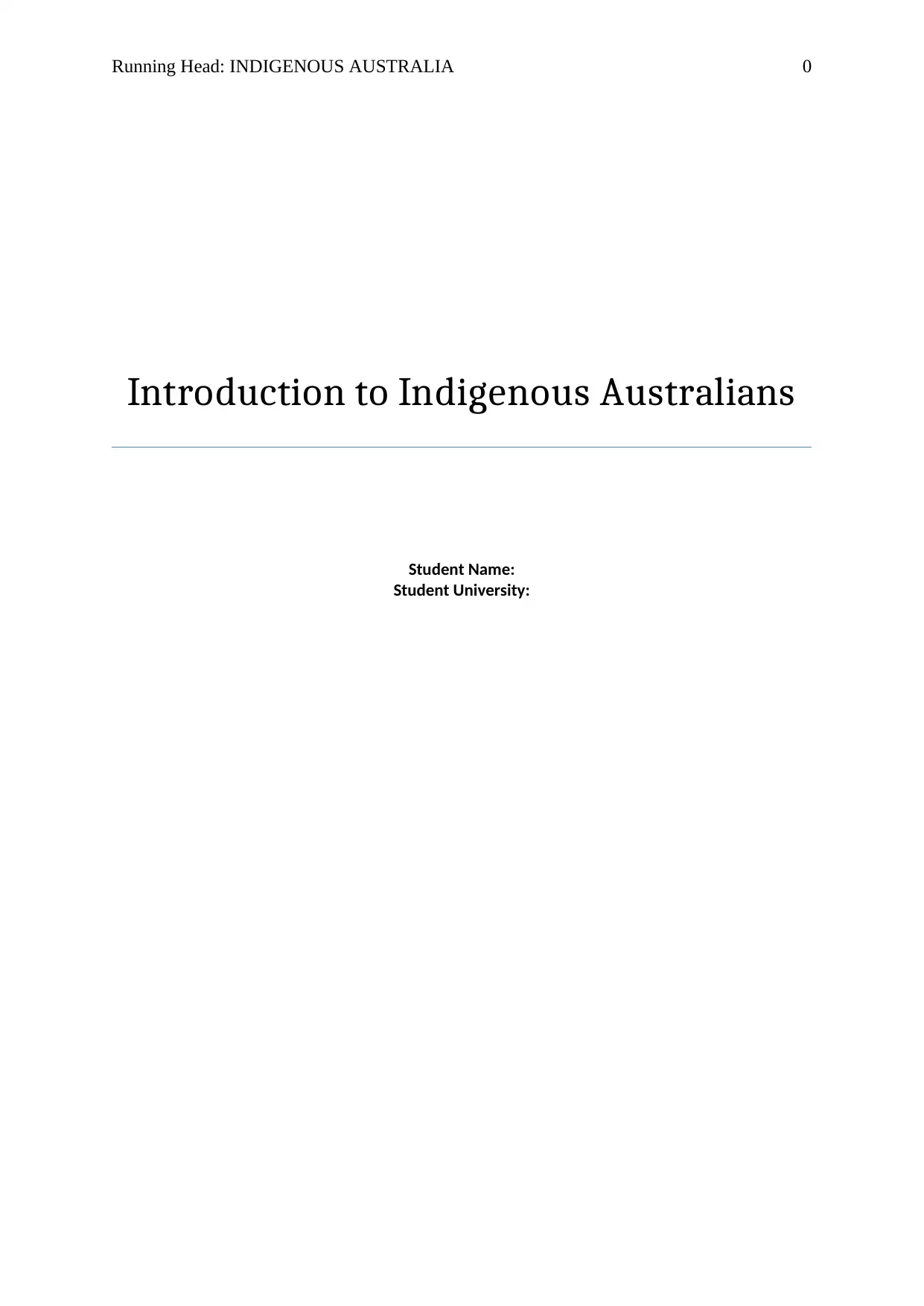
Running Head: INDIGENOUS AUSTRALIA 0
Introduction to Indigenous Australians
Student Name:
Student University:
Introduction to Indigenous Australians
Student Name:
Student University:
Paraphrase This Document
Need a fresh take? Get an instant paraphrase of this document with our AI Paraphraser
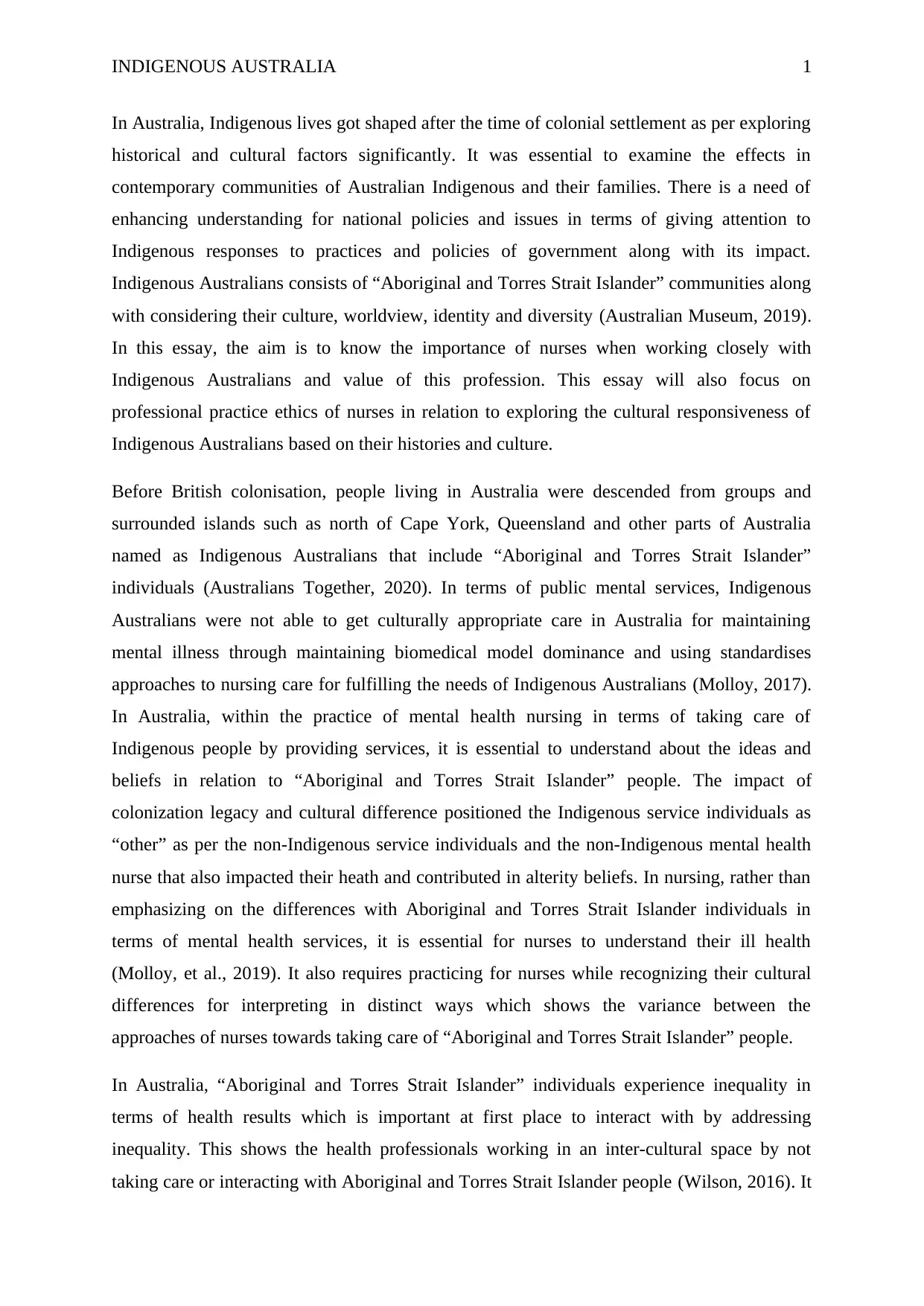
INDIGENOUS AUSTRALIA 1
In Australia, Indigenous lives got shaped after the time of colonial settlement as per exploring
historical and cultural factors significantly. It was essential to examine the effects in
contemporary communities of Australian Indigenous and their families. There is a need of
enhancing understanding for national policies and issues in terms of giving attention to
Indigenous responses to practices and policies of government along with its impact.
Indigenous Australians consists of “Aboriginal and Torres Strait Islander” communities along
with considering their culture, worldview, identity and diversity (Australian Museum, 2019).
In this essay, the aim is to know the importance of nurses when working closely with
Indigenous Australians and value of this profession. This essay will also focus on
professional practice ethics of nurses in relation to exploring the cultural responsiveness of
Indigenous Australians based on their histories and culture.
Before British colonisation, people living in Australia were descended from groups and
surrounded islands such as north of Cape York, Queensland and other parts of Australia
named as Indigenous Australians that include “Aboriginal and Torres Strait Islander”
individuals (Australians Together, 2020). In terms of public mental services, Indigenous
Australians were not able to get culturally appropriate care in Australia for maintaining
mental illness through maintaining biomedical model dominance and using standardises
approaches to nursing care for fulfilling the needs of Indigenous Australians (Molloy, 2017).
In Australia, within the practice of mental health nursing in terms of taking care of
Indigenous people by providing services, it is essential to understand about the ideas and
beliefs in relation to “Aboriginal and Torres Strait Islander” people. The impact of
colonization legacy and cultural difference positioned the Indigenous service individuals as
“other” as per the non-Indigenous service individuals and the non-Indigenous mental health
nurse that also impacted their heath and contributed in alterity beliefs. In nursing, rather than
emphasizing on the differences with Aboriginal and Torres Strait Islander individuals in
terms of mental health services, it is essential for nurses to understand their ill health
(Molloy, et al., 2019). It also requires practicing for nurses while recognizing their cultural
differences for interpreting in distinct ways which shows the variance between the
approaches of nurses towards taking care of “Aboriginal and Torres Strait Islander” people.
In Australia, “Aboriginal and Torres Strait Islander” individuals experience inequality in
terms of health results which is important at first place to interact with by addressing
inequality. This shows the health professionals working in an inter-cultural space by not
taking care or interacting with Aboriginal and Torres Strait Islander people (Wilson, 2016). It
In Australia, Indigenous lives got shaped after the time of colonial settlement as per exploring
historical and cultural factors significantly. It was essential to examine the effects in
contemporary communities of Australian Indigenous and their families. There is a need of
enhancing understanding for national policies and issues in terms of giving attention to
Indigenous responses to practices and policies of government along with its impact.
Indigenous Australians consists of “Aboriginal and Torres Strait Islander” communities along
with considering their culture, worldview, identity and diversity (Australian Museum, 2019).
In this essay, the aim is to know the importance of nurses when working closely with
Indigenous Australians and value of this profession. This essay will also focus on
professional practice ethics of nurses in relation to exploring the cultural responsiveness of
Indigenous Australians based on their histories and culture.
Before British colonisation, people living in Australia were descended from groups and
surrounded islands such as north of Cape York, Queensland and other parts of Australia
named as Indigenous Australians that include “Aboriginal and Torres Strait Islander”
individuals (Australians Together, 2020). In terms of public mental services, Indigenous
Australians were not able to get culturally appropriate care in Australia for maintaining
mental illness through maintaining biomedical model dominance and using standardises
approaches to nursing care for fulfilling the needs of Indigenous Australians (Molloy, 2017).
In Australia, within the practice of mental health nursing in terms of taking care of
Indigenous people by providing services, it is essential to understand about the ideas and
beliefs in relation to “Aboriginal and Torres Strait Islander” people. The impact of
colonization legacy and cultural difference positioned the Indigenous service individuals as
“other” as per the non-Indigenous service individuals and the non-Indigenous mental health
nurse that also impacted their heath and contributed in alterity beliefs. In nursing, rather than
emphasizing on the differences with Aboriginal and Torres Strait Islander individuals in
terms of mental health services, it is essential for nurses to understand their ill health
(Molloy, et al., 2019). It also requires practicing for nurses while recognizing their cultural
differences for interpreting in distinct ways which shows the variance between the
approaches of nurses towards taking care of “Aboriginal and Torres Strait Islander” people.
In Australia, “Aboriginal and Torres Strait Islander” individuals experience inequality in
terms of health results which is important at first place to interact with by addressing
inequality. This shows the health professionals working in an inter-cultural space by not
taking care or interacting with Aboriginal and Torres Strait Islander people (Wilson, 2016). It
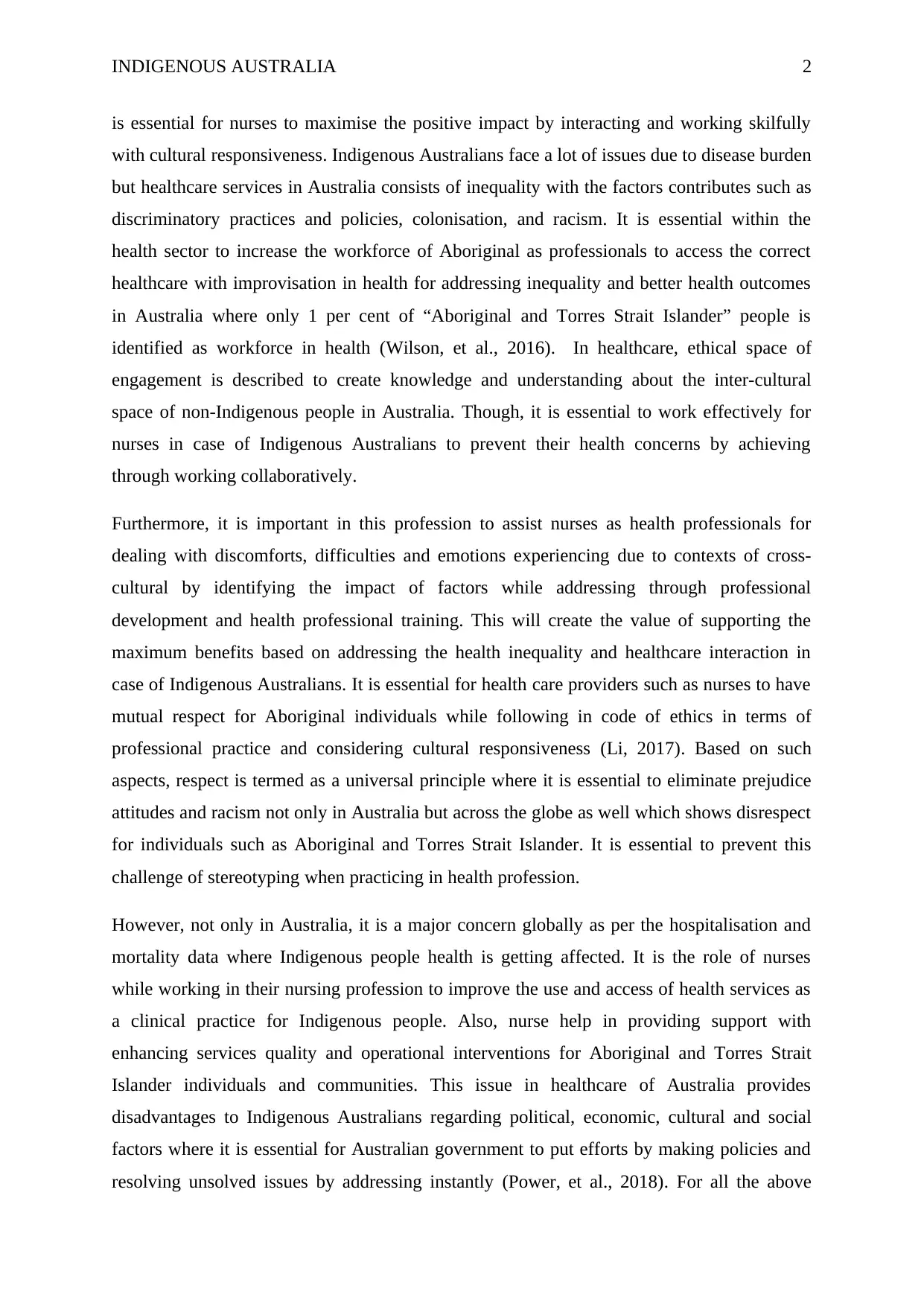
INDIGENOUS AUSTRALIA 2
is essential for nurses to maximise the positive impact by interacting and working skilfully
with cultural responsiveness. Indigenous Australians face a lot of issues due to disease burden
but healthcare services in Australia consists of inequality with the factors contributes such as
discriminatory practices and policies, colonisation, and racism. It is essential within the
health sector to increase the workforce of Aboriginal as professionals to access the correct
healthcare with improvisation in health for addressing inequality and better health outcomes
in Australia where only 1 per cent of “Aboriginal and Torres Strait Islander” people is
identified as workforce in health (Wilson, et al., 2016). In healthcare, ethical space of
engagement is described to create knowledge and understanding about the inter-cultural
space of non-Indigenous people in Australia. Though, it is essential to work effectively for
nurses in case of Indigenous Australians to prevent their health concerns by achieving
through working collaboratively.
Furthermore, it is important in this profession to assist nurses as health professionals for
dealing with discomforts, difficulties and emotions experiencing due to contexts of cross-
cultural by identifying the impact of factors while addressing through professional
development and health professional training. This will create the value of supporting the
maximum benefits based on addressing the health inequality and healthcare interaction in
case of Indigenous Australians. It is essential for health care providers such as nurses to have
mutual respect for Aboriginal individuals while following in code of ethics in terms of
professional practice and considering cultural responsiveness (Li, 2017). Based on such
aspects, respect is termed as a universal principle where it is essential to eliminate prejudice
attitudes and racism not only in Australia but across the globe as well which shows disrespect
for individuals such as Aboriginal and Torres Strait Islander. It is essential to prevent this
challenge of stereotyping when practicing in health profession.
However, not only in Australia, it is a major concern globally as per the hospitalisation and
mortality data where Indigenous people health is getting affected. It is the role of nurses
while working in their nursing profession to improve the use and access of health services as
a clinical practice for Indigenous people. Also, nurse help in providing support with
enhancing services quality and operational interventions for Aboriginal and Torres Strait
Islander individuals and communities. This issue in healthcare of Australia provides
disadvantages to Indigenous Australians regarding political, economic, cultural and social
factors where it is essential for Australian government to put efforts by making policies and
resolving unsolved issues by addressing instantly (Power, et al., 2018). For all the above
is essential for nurses to maximise the positive impact by interacting and working skilfully
with cultural responsiveness. Indigenous Australians face a lot of issues due to disease burden
but healthcare services in Australia consists of inequality with the factors contributes such as
discriminatory practices and policies, colonisation, and racism. It is essential within the
health sector to increase the workforce of Aboriginal as professionals to access the correct
healthcare with improvisation in health for addressing inequality and better health outcomes
in Australia where only 1 per cent of “Aboriginal and Torres Strait Islander” people is
identified as workforce in health (Wilson, et al., 2016). In healthcare, ethical space of
engagement is described to create knowledge and understanding about the inter-cultural
space of non-Indigenous people in Australia. Though, it is essential to work effectively for
nurses in case of Indigenous Australians to prevent their health concerns by achieving
through working collaboratively.
Furthermore, it is important in this profession to assist nurses as health professionals for
dealing with discomforts, difficulties and emotions experiencing due to contexts of cross-
cultural by identifying the impact of factors while addressing through professional
development and health professional training. This will create the value of supporting the
maximum benefits based on addressing the health inequality and healthcare interaction in
case of Indigenous Australians. It is essential for health care providers such as nurses to have
mutual respect for Aboriginal individuals while following in code of ethics in terms of
professional practice and considering cultural responsiveness (Li, 2017). Based on such
aspects, respect is termed as a universal principle where it is essential to eliminate prejudice
attitudes and racism not only in Australia but across the globe as well which shows disrespect
for individuals such as Aboriginal and Torres Strait Islander. It is essential to prevent this
challenge of stereotyping when practicing in health profession.
However, not only in Australia, it is a major concern globally as per the hospitalisation and
mortality data where Indigenous people health is getting affected. It is the role of nurses
while working in their nursing profession to improve the use and access of health services as
a clinical practice for Indigenous people. Also, nurse help in providing support with
enhancing services quality and operational interventions for Aboriginal and Torres Strait
Islander individuals and communities. This issue in healthcare of Australia provides
disadvantages to Indigenous Australians regarding political, economic, cultural and social
factors where it is essential for Australian government to put efforts by making policies and
resolving unsolved issues by addressing instantly (Power, et al., 2018). For all the above
⊘ This is a preview!⊘
Do you want full access?
Subscribe today to unlock all pages.

Trusted by 1+ million students worldwide
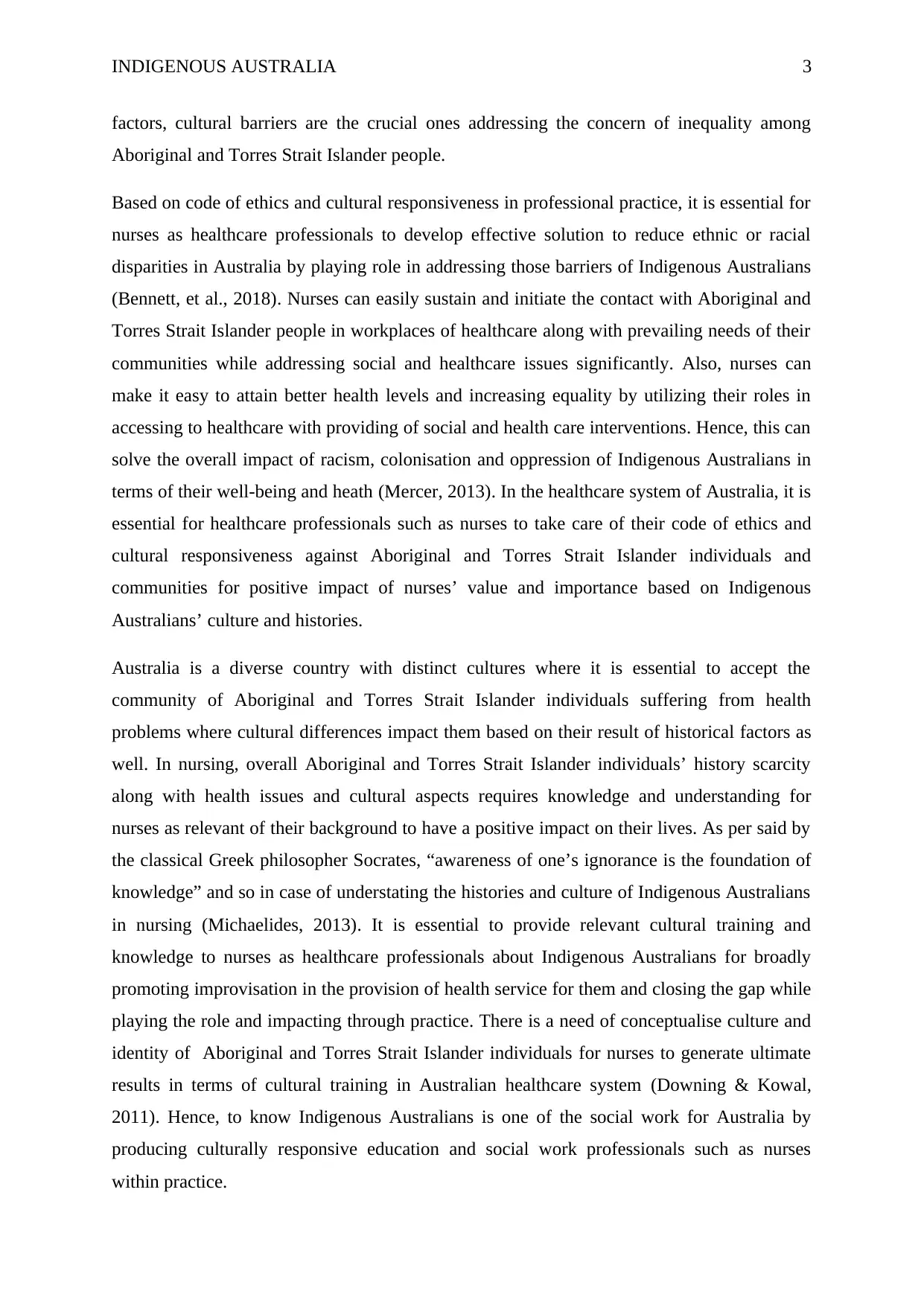
INDIGENOUS AUSTRALIA 3
factors, cultural barriers are the crucial ones addressing the concern of inequality among
Aboriginal and Torres Strait Islander people.
Based on code of ethics and cultural responsiveness in professional practice, it is essential for
nurses as healthcare professionals to develop effective solution to reduce ethnic or racial
disparities in Australia by playing role in addressing those barriers of Indigenous Australians
(Bennett, et al., 2018). Nurses can easily sustain and initiate the contact with Aboriginal and
Torres Strait Islander people in workplaces of healthcare along with prevailing needs of their
communities while addressing social and healthcare issues significantly. Also, nurses can
make it easy to attain better health levels and increasing equality by utilizing their roles in
accessing to healthcare with providing of social and health care interventions. Hence, this can
solve the overall impact of racism, colonisation and oppression of Indigenous Australians in
terms of their well-being and heath (Mercer, 2013). In the healthcare system of Australia, it is
essential for healthcare professionals such as nurses to take care of their code of ethics and
cultural responsiveness against Aboriginal and Torres Strait Islander individuals and
communities for positive impact of nurses’ value and importance based on Indigenous
Australians’ culture and histories.
Australia is a diverse country with distinct cultures where it is essential to accept the
community of Aboriginal and Torres Strait Islander individuals suffering from health
problems where cultural differences impact them based on their result of historical factors as
well. In nursing, overall Aboriginal and Torres Strait Islander individuals’ history scarcity
along with health issues and cultural aspects requires knowledge and understanding for
nurses as relevant of their background to have a positive impact on their lives. As per said by
the classical Greek philosopher Socrates, “awareness of one’s ignorance is the foundation of
knowledge” and so in case of understating the histories and culture of Indigenous Australians
in nursing (Michaelides, 2013). It is essential to provide relevant cultural training and
knowledge to nurses as healthcare professionals about Indigenous Australians for broadly
promoting improvisation in the provision of health service for them and closing the gap while
playing the role and impacting through practice. There is a need of conceptualise culture and
identity of Aboriginal and Torres Strait Islander individuals for nurses to generate ultimate
results in terms of cultural training in Australian healthcare system (Downing & Kowal,
2011). Hence, to know Indigenous Australians is one of the social work for Australia by
producing culturally responsive education and social work professionals such as nurses
within practice.
factors, cultural barriers are the crucial ones addressing the concern of inequality among
Aboriginal and Torres Strait Islander people.
Based on code of ethics and cultural responsiveness in professional practice, it is essential for
nurses as healthcare professionals to develop effective solution to reduce ethnic or racial
disparities in Australia by playing role in addressing those barriers of Indigenous Australians
(Bennett, et al., 2018). Nurses can easily sustain and initiate the contact with Aboriginal and
Torres Strait Islander people in workplaces of healthcare along with prevailing needs of their
communities while addressing social and healthcare issues significantly. Also, nurses can
make it easy to attain better health levels and increasing equality by utilizing their roles in
accessing to healthcare with providing of social and health care interventions. Hence, this can
solve the overall impact of racism, colonisation and oppression of Indigenous Australians in
terms of their well-being and heath (Mercer, 2013). In the healthcare system of Australia, it is
essential for healthcare professionals such as nurses to take care of their code of ethics and
cultural responsiveness against Aboriginal and Torres Strait Islander individuals and
communities for positive impact of nurses’ value and importance based on Indigenous
Australians’ culture and histories.
Australia is a diverse country with distinct cultures where it is essential to accept the
community of Aboriginal and Torres Strait Islander individuals suffering from health
problems where cultural differences impact them based on their result of historical factors as
well. In nursing, overall Aboriginal and Torres Strait Islander individuals’ history scarcity
along with health issues and cultural aspects requires knowledge and understanding for
nurses as relevant of their background to have a positive impact on their lives. As per said by
the classical Greek philosopher Socrates, “awareness of one’s ignorance is the foundation of
knowledge” and so in case of understating the histories and culture of Indigenous Australians
in nursing (Michaelides, 2013). It is essential to provide relevant cultural training and
knowledge to nurses as healthcare professionals about Indigenous Australians for broadly
promoting improvisation in the provision of health service for them and closing the gap while
playing the role and impacting through practice. There is a need of conceptualise culture and
identity of Aboriginal and Torres Strait Islander individuals for nurses to generate ultimate
results in terms of cultural training in Australian healthcare system (Downing & Kowal,
2011). Hence, to know Indigenous Australians is one of the social work for Australia by
producing culturally responsive education and social work professionals such as nurses
within practice.
Paraphrase This Document
Need a fresh take? Get an instant paraphrase of this document with our AI Paraphraser
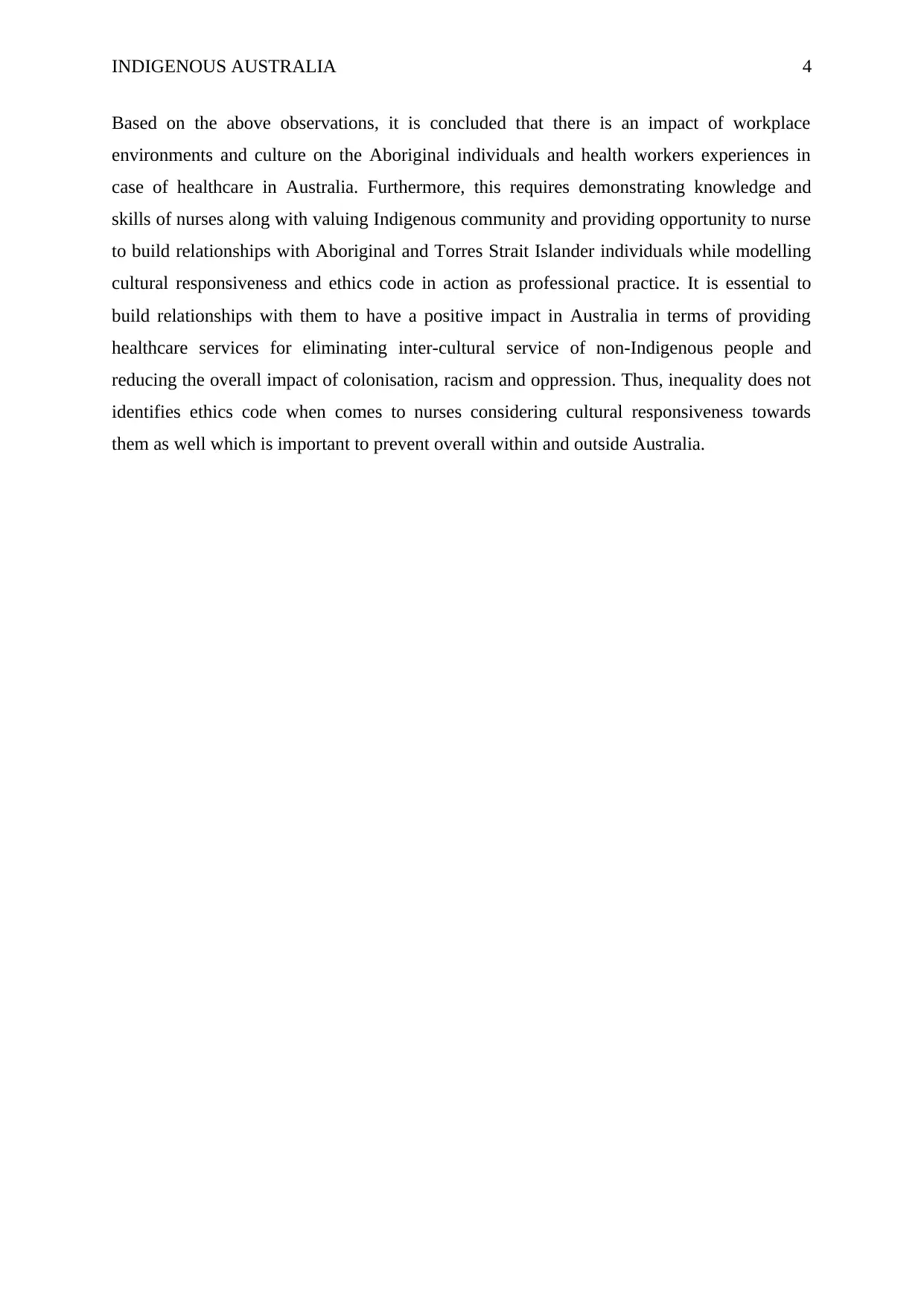
INDIGENOUS AUSTRALIA 4
Based on the above observations, it is concluded that there is an impact of workplace
environments and culture on the Aboriginal individuals and health workers experiences in
case of healthcare in Australia. Furthermore, this requires demonstrating knowledge and
skills of nurses along with valuing Indigenous community and providing opportunity to nurse
to build relationships with Aboriginal and Torres Strait Islander individuals while modelling
cultural responsiveness and ethics code in action as professional practice. It is essential to
build relationships with them to have a positive impact in Australia in terms of providing
healthcare services for eliminating inter-cultural service of non-Indigenous people and
reducing the overall impact of colonisation, racism and oppression. Thus, inequality does not
identifies ethics code when comes to nurses considering cultural responsiveness towards
them as well which is important to prevent overall within and outside Australia.
Based on the above observations, it is concluded that there is an impact of workplace
environments and culture on the Aboriginal individuals and health workers experiences in
case of healthcare in Australia. Furthermore, this requires demonstrating knowledge and
skills of nurses along with valuing Indigenous community and providing opportunity to nurse
to build relationships with Aboriginal and Torres Strait Islander individuals while modelling
cultural responsiveness and ethics code in action as professional practice. It is essential to
build relationships with them to have a positive impact in Australia in terms of providing
healthcare services for eliminating inter-cultural service of non-Indigenous people and
reducing the overall impact of colonisation, racism and oppression. Thus, inequality does not
identifies ethics code when comes to nurses considering cultural responsiveness towards
them as well which is important to prevent overall within and outside Australia.
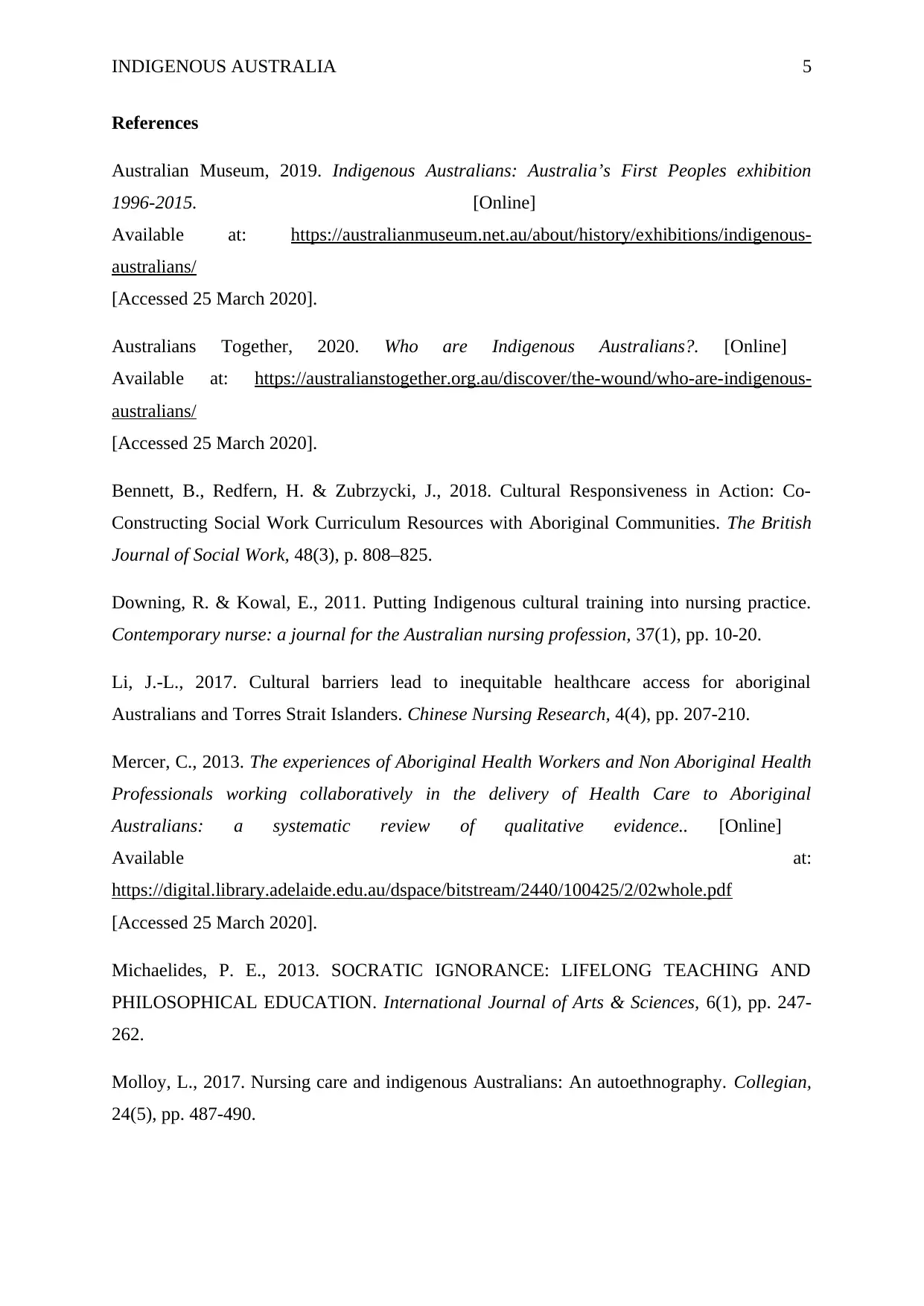
INDIGENOUS AUSTRALIA 5
References
Australian Museum, 2019. Indigenous Australians: Australia’s First Peoples exhibition
1996-2015. [Online]
Available at: https://australianmuseum.net.au/about/history/exhibitions/indigenous-
australians/
[Accessed 25 March 2020].
Australians Together, 2020. Who are Indigenous Australians?. [Online]
Available at: https://australianstogether.org.au/discover/the-wound/who-are-indigenous-
australians/
[Accessed 25 March 2020].
Bennett, B., Redfern, H. & Zubrzycki, J., 2018. Cultural Responsiveness in Action: Co-
Constructing Social Work Curriculum Resources with Aboriginal Communities. The British
Journal of Social Work, 48(3), p. 808–825.
Downing, R. & Kowal, E., 2011. Putting Indigenous cultural training into nursing practice.
Contemporary nurse: a journal for the Australian nursing profession, 37(1), pp. 10-20.
Li, J.-L., 2017. Cultural barriers lead to inequitable healthcare access for aboriginal
Australians and Torres Strait Islanders. Chinese Nursing Research, 4(4), pp. 207-210.
Mercer, C., 2013. The experiences of Aboriginal Health Workers and Non Aboriginal Health
Professionals working collaboratively in the delivery of Health Care to Aboriginal
Australians: a systematic review of qualitative evidence.. [Online]
Available at:
https://digital.library.adelaide.edu.au/dspace/bitstream/2440/100425/2/02whole.pdf
[Accessed 25 March 2020].
Michaelides, P. E., 2013. SOCRATIC IGNORANCE: LIFELONG TEACHING AND
PHILOSOPHICAL EDUCATION. International Journal of Arts & Sciences, 6(1), pp. 247-
262.
Molloy, L., 2017. Nursing care and indigenous Australians: An autoethnography. Collegian,
24(5), pp. 487-490.
References
Australian Museum, 2019. Indigenous Australians: Australia’s First Peoples exhibition
1996-2015. [Online]
Available at: https://australianmuseum.net.au/about/history/exhibitions/indigenous-
australians/
[Accessed 25 March 2020].
Australians Together, 2020. Who are Indigenous Australians?. [Online]
Available at: https://australianstogether.org.au/discover/the-wound/who-are-indigenous-
australians/
[Accessed 25 March 2020].
Bennett, B., Redfern, H. & Zubrzycki, J., 2018. Cultural Responsiveness in Action: Co-
Constructing Social Work Curriculum Resources with Aboriginal Communities. The British
Journal of Social Work, 48(3), p. 808–825.
Downing, R. & Kowal, E., 2011. Putting Indigenous cultural training into nursing practice.
Contemporary nurse: a journal for the Australian nursing profession, 37(1), pp. 10-20.
Li, J.-L., 2017. Cultural barriers lead to inequitable healthcare access for aboriginal
Australians and Torres Strait Islanders. Chinese Nursing Research, 4(4), pp. 207-210.
Mercer, C., 2013. The experiences of Aboriginal Health Workers and Non Aboriginal Health
Professionals working collaboratively in the delivery of Health Care to Aboriginal
Australians: a systematic review of qualitative evidence.. [Online]
Available at:
https://digital.library.adelaide.edu.au/dspace/bitstream/2440/100425/2/02whole.pdf
[Accessed 25 March 2020].
Michaelides, P. E., 2013. SOCRATIC IGNORANCE: LIFELONG TEACHING AND
PHILOSOPHICAL EDUCATION. International Journal of Arts & Sciences, 6(1), pp. 247-
262.
Molloy, L., 2017. Nursing care and indigenous Australians: An autoethnography. Collegian,
24(5), pp. 487-490.
⊘ This is a preview!⊘
Do you want full access?
Subscribe today to unlock all pages.

Trusted by 1+ million students worldwide
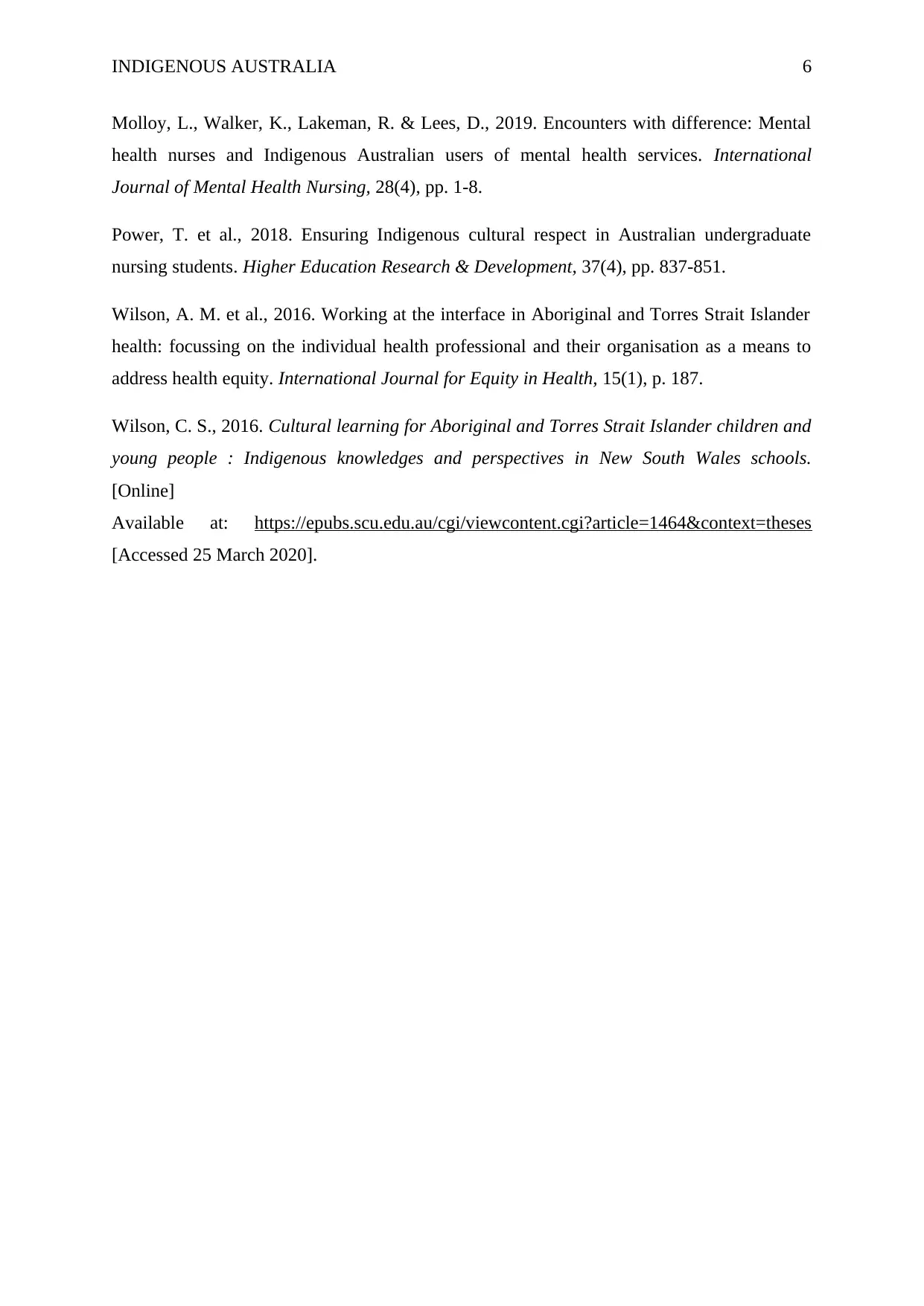
INDIGENOUS AUSTRALIA 6
Molloy, L., Walker, K., Lakeman, R. & Lees, D., 2019. Encounters with difference: Mental
health nurses and Indigenous Australian users of mental health services. International
Journal of Mental Health Nursing, 28(4), pp. 1-8.
Power, T. et al., 2018. Ensuring Indigenous cultural respect in Australian undergraduate
nursing students. Higher Education Research & Development, 37(4), pp. 837-851.
Wilson, A. M. et al., 2016. Working at the interface in Aboriginal and Torres Strait Islander
health: focussing on the individual health professional and their organisation as a means to
address health equity. International Journal for Equity in Health, 15(1), p. 187.
Wilson, C. S., 2016. Cultural learning for Aboriginal and Torres Strait Islander children and
young people : Indigenous knowledges and perspectives in New South Wales schools.
[Online]
Available at: https://epubs.scu.edu.au/cgi/viewcontent.cgi?article=1464&context=theses
[Accessed 25 March 2020].
Molloy, L., Walker, K., Lakeman, R. & Lees, D., 2019. Encounters with difference: Mental
health nurses and Indigenous Australian users of mental health services. International
Journal of Mental Health Nursing, 28(4), pp. 1-8.
Power, T. et al., 2018. Ensuring Indigenous cultural respect in Australian undergraduate
nursing students. Higher Education Research & Development, 37(4), pp. 837-851.
Wilson, A. M. et al., 2016. Working at the interface in Aboriginal and Torres Strait Islander
health: focussing on the individual health professional and their organisation as a means to
address health equity. International Journal for Equity in Health, 15(1), p. 187.
Wilson, C. S., 2016. Cultural learning for Aboriginal and Torres Strait Islander children and
young people : Indigenous knowledges and perspectives in New South Wales schools.
[Online]
Available at: https://epubs.scu.edu.au/cgi/viewcontent.cgi?article=1464&context=theses
[Accessed 25 March 2020].
1 out of 7
Related Documents
Your All-in-One AI-Powered Toolkit for Academic Success.
+13062052269
info@desklib.com
Available 24*7 on WhatsApp / Email
![[object Object]](/_next/static/media/star-bottom.7253800d.svg)
Unlock your academic potential
Copyright © 2020–2026 A2Z Services. All Rights Reserved. Developed and managed by ZUCOL.





